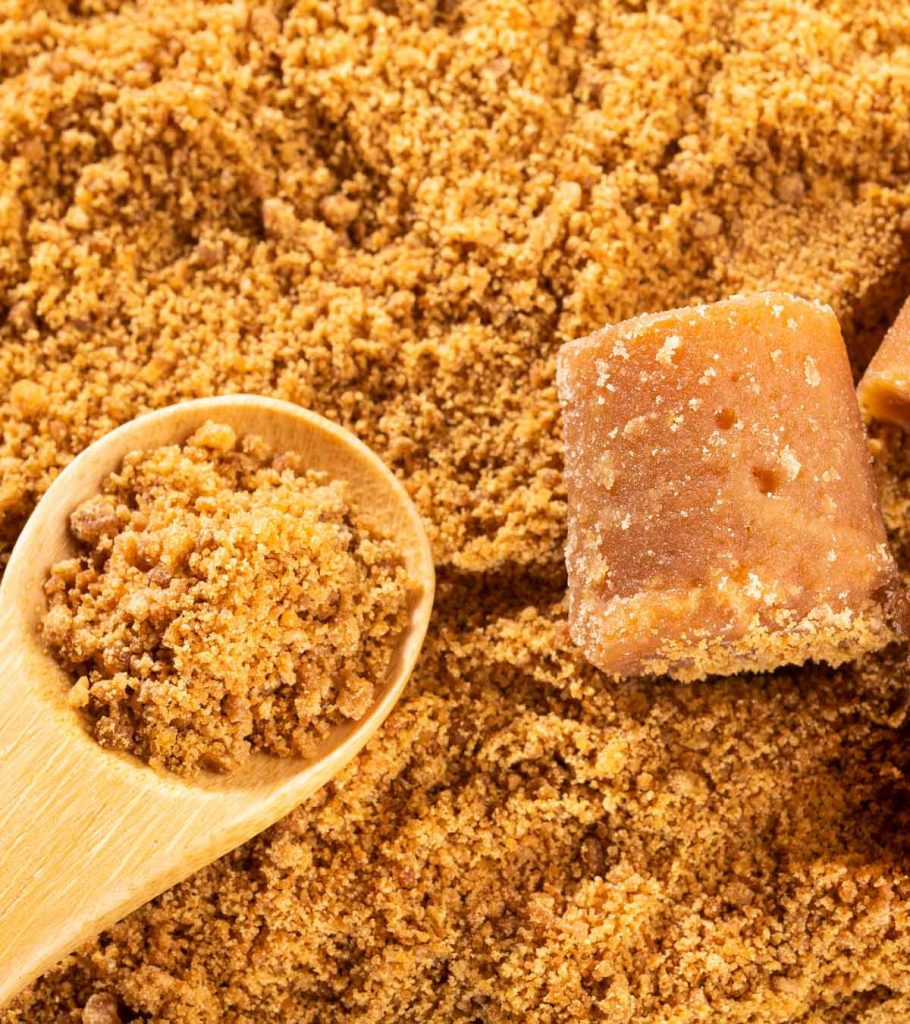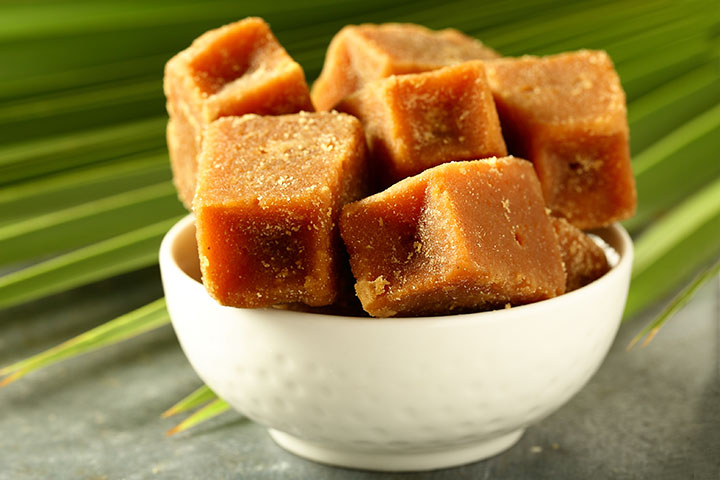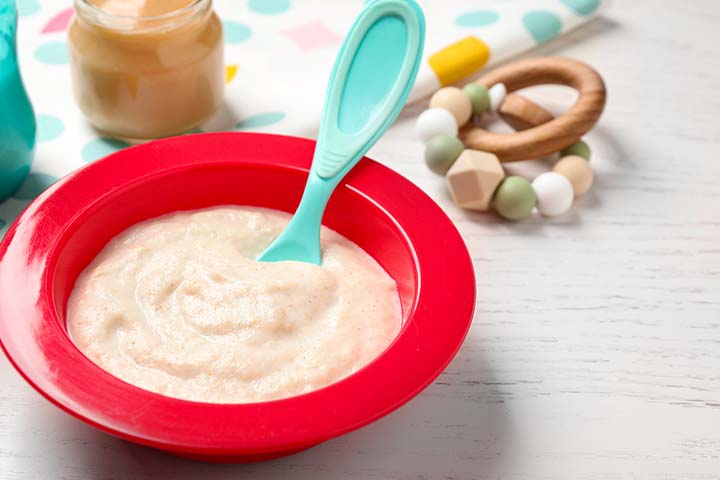Jaggery is a healthy alternative to refined or white sugar as it contains trace minerals and certain bioactive compoundsiXChemicals found in plants and food items in small amounts that are beneficial for health that may benefit health in the long run. However, as it is a natural sweetener, you might want to know about the safety of jaggery for babies.
Offering jaggery to your baby at the right age and in age-appropriate amounts is essential to ensure the baby’s safety. Besides, it can help prevent the baby from developing a liking to sweet tastes.
Jaggery is often made with concentrated sugarcane juice, date palm sap, or coconut sap. Keep reading as we tell you more about the safety of jaggery for babies, the right age to feed it, its possible health benefits and side effects, and the right way to include jaggery in your baby’s diet.
Is Jaggery Good For Babies?
Jaggery is usually preferred to white sugar (1). Pediatricians recommend avoiding sugar for babies under 12 months of age (2). Jaggery can be considered an alternative but should be fed in moderation.
When Can Babies Start Having Jaggery?
Babies can have jaggery as soon as they start eating solids, which is around the age of six months. However, the appropriate age may vary for each baby. Therefore, consult a doctor or pediatric nutritionist to know the right age to introduce jaggery to your baby. Once you have the doctor’s approval, you may introduce unprocessed powdered jaggery by adding it to infant foods, such as porridge and purees.
However, before introducing jaggery, do ask your doctor about the ideal amount you can use for your baby.
Health Benefits Of Jaggery For Infants
The nutritional composition of this ancient superfood changes depending on the source – sugarcane, date palm, or coconut. However, there are some general benefits of jaggery, irrespective of the source.
- Energy-dense: Jaggery can serve as an energy booster and intensifies the total energy value of traditional foods given to the babies while weaningiXProcess of gradually transforming a baby’s diet from breast milk to solids and other fluids(3).
- Nutrient supply: Jaggery is a mineral-rich food which contains iron, calcium, sodium, and potassium. It also has traces of a few vital vitamins that could be beneficial for your baby (4). Moderate consumption of jaggery could contribute to the recommended dietary allowance (RDA) of the baby.
- Iron deficiency:When consumed with a well-balanced diet, jaggery, an iron-rich food, could help supplement iron (5). In the long run, this could help manage iron-deficiency anemiaiXA health condition caused due to low levels of iron in the body.
- Bone health: Calcium, phosphorus, and magnesium are some of the vital minerals that are crucial for maintaining bone health. Jaggery contains all these trace minerals and thus may support bone health. However, there are better sources for these nutrients, and you do not have to use jaggery exclusively for these minerals.
- Digestive health: As per traditional practice in India, jaggery is consumed after a meal since it is believed to be a digestive aid. However, there are no scientific studies to back this belief. You may give jaggery water or syrup once in a while to your young infant to help support digestion.
- Immunity: In Ayurvedic sciences, jaggery is used to treat various ailments and serves as an immune booster food. However, clinical trials on the same are lacking. Nevertheless, the presence of trace minerals and vitamins in jaggery may help babies combat infections in the long run.
- Liver detoxification: The use of jaggery with ginger for liver detoxification is documented in traditional medicine (6). Alternative medicine believes that jaggery is an unrefined sugar with no additives, but rich in antioxidants, like Vitamin C, and could clean or detox the liver. However, there are no clinical studies to back this theory.
- Overall health: Jaggery is often used for the treatment of cold, cough, and flu in traditional medicine. Besides, it is also believed to cure intestinal worms and prevent constipation. However, clinical studies to validate these uses are limited.
Consuming jaggery can have some health benefits. However, its consumption in infants and toddlers must be limited due to some probable side-effects.
Remember that jaggery is considered better when compared to white sugar. But it is still a form of sugar and cannot be overconsumed.
Possible Side-Effects Of Jaggery In Infants
Excess consumption may lead to the following unwanted effects.
- Sweet addiction: Avoid feeding excess jaggery since it may cause the baby to become addicted to its sweet taste (7).
- Adverse reactions:Jaggery, in general, is considered as anti-allergic. However, it might cause sensitivity or intolerance in some cases. Thus, if you observe any signs of sensitivity or intolerance like mild rashes on your baby, then discontinue feeding and consult a pediatrician.
- Childhood obesity: Traditionally, jaggery, a gluten-free food, is used to increase the weight of an infant. However, excessive consumption can significantly increase the risk of obesity in children because jaggery is still a form of sugar. According to a study that was conducted by the Centers for Disease Control and Prevention, about 12.7% of all children aged between two and five had obesity.
- Tooth decay: Jaggery is about 80% simple sugar, which can cause cavities and tooth decay when consumed in excess. Thus, make sure you rinse the baby’s mouth with water after feeding jaggery.
Ways To Include Jaggery In Your Infant and Toddler’s Diet
Try to access organic jaggery because standard non-organic jaggery could contain compounds such as sulfur dioxide that may not be good for the baby’s health.
Here are some of the age-appropriate ways to add jaggery to homemade baby food recipes.
- For young infants who have just started solids, jaggery water can be given along with other weaning foods.
Outlining her approach to incorporating palm jaggery syrup in her baby’s weaning diet, Jiya, a mother, notes, “Palm jaggery (chakkara) in syrup form has been added to baby porridges (kurukku) in Kerala for generations. Babu’s (her eight-month-old baby) doctor also gave his thumbs up regarding jaggery, so palm jaggery I decided it will be. I add the palm jaggery syrup to my baby’s ragi, broken wheat (sooji gothambu), and kunnan kaya porridges (i).”
- For babies of about seven months of age, you may try giving jaggery syrup mixed with nut powder (only if the baby is not allergic to nuts). It is one of the Indian food ideas that several pediatricians recommend. Feed it in small quantities.
- Jaggery water or jaggery syrup can be added to homemade Cerelac, or it can also be added to the commercial baby food mix for a rich flavor. Do not add more than half a teaspoon in one serving.
- You may add powdered jaggery or jaggery syrup to porridge, breakfast cereals like quinoa, and vegetable preparation like sambhar.
- Prepare simple finger food as a healthy snack or sweet dishes with jaggery. You may consider adding ingredients like sprouted ragi health mix, wheat flour, and ginger powder to intensify the nutritional value of the final recipe.
Jaggery for babies is a healthier alternative to white sugar. You may include jaggery in your child’s food when they start eating solids; however, it is better to consult a doctor before doing so. Moderate amounts of jaggery, when added to food can enhance an infant’s nutrition and provide energy, manage iron deficiency, and detoxify the liver. However, excess jaggery may cause sweet addiction, mild rashes, or tooth decay. Always use organic jaggery for infants as they are safer. You may also try palm jaggery syrup and palm sugar as an alternative. This preservative-free food is nutrient-dense and vegan-friendly at the same time. Small quantities of jaggery and a balanced diet can help in the healthy growth of your baby.
Key Pointers
- Jaggery is a processed form of sugarcane juice or palm sap, and it is a healthier sweet substitute than sugar.
- Jaggery may be introduced to babies beyond six months after consulting a pediatrician.
- Jaggery is a good source of nutrients such as iron and provides instant energy.
- It can be used as a flavoring agent in purees and porridges, but should be used in moderation.
- Excessive jaggery consumption may lead to sweet addiction, obesity, and other adverse health consequences.















